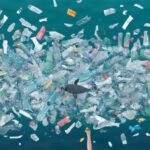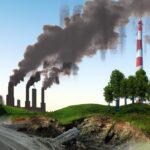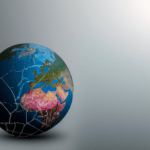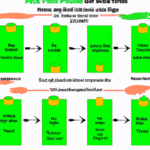Plastic pollution has far-reaching and devastating consequences for our environment and marine life. The excessive use and improper disposal of plastic items lead to widespread contamination of our oceans and ecosystems. Marine animals often mistake plastic debris for food, leading to their slow and painful deaths due to ingestion or entanglement. The presence of microplastics in our waterways poses a threat to human health as these tiny particles can enter our food chain. Additionally, plastic waste contributes to climate change through the release of greenhouse gases during the production and recycling processes. It is imperative that we take immediate action to reduce plastic pollution and protect our planet for future generations.
Table of Contents
- contribution to greenhouse gases
- economic costs.
- Effects on marine life
- impact on human health
- pollution of water sources
(Plastic pollution: is it really that bad?)
Plastic pollution has severe consequences for our environment and the health of living organisms. It has become a global crisis that demands immediate attention. When plastic waste enters our oceans and ecosystems, it wreaks havoc on marine life. Fish, turtles, and seabirds mistake plastic for food, leading to ingestion and the eventual death of these animals.
Plastic pollution also affects human health. Harmful chemicals present in plastics can leach into our food and water supply, posing serious health risks. The accumulation of plastic waste in landfills contributes to the emission of greenhouse gases, exacerbating climate change. Plastic does not biodegrade, but instead breaks down into smaller microplastics which release toxic substances into the environment.
Plastic pollution not only affects the physical environment but also the economy. Coastal communities that rely on tourism suffer when polluted beaches deter visitors. Cleanup efforts to remove plastic waste from natural habitats are costly, diverting resources that could be better used elsewhere.
The consequences of plastic pollution extend beyond immediate threats to our environment and economy. They also highlight the urgent need for global action. Governments, businesses, and individuals must change their behavior by reducing plastic consumption, promoting recycling, and exploring sustainable alternatives.
By raising awareness and taking proactive measures, we can help mitigate the consequences of plastic pollution. Each individual has a role to play in making a positive impact on our planet. Together, we can protect our environment, safeguard our health, and secure a better future for generations to come.
contribution to greenhouse gases
Contribution to Greenhouse Gases:
Plastic pollution is not just an environmental issue; it also has significant implications for greenhouse gas emissions. The production and disposal of plastic materials contribute to the release of greenhouse gases into the atmosphere, exacerbating climate change.
One major way plastic contributes to greenhouse gases is through its manufacturing process. The production of plastic requires the extraction and processing of fossil fuels, such as oil and natural gas, which are rich in carbon. These fuels release carbon dioxide when burned, a primary greenhouse gas responsible for trapping heat in the atmosphere.
Furthermore, plastic manufacturing itself is an energy-intensive process. The extraction, transport, and refining of fossil fuels require significant amounts of energy, usually derived from the combustion of additional fossil fuels. This further increases CO2 emissions and other greenhouse gases like methane and nitrous oxide.
Plastic waste adds to greenhouse gas emissions during its disposal. When plastic breaks down in landfills, it undergoes a process called anaerobic decomposition, in which microorganisms break down the material in the absence of oxygen. This results in the release of methane, a potent greenhouse gas that has a much higher warming potential than carbon dioxide.
Moreover, improper plastic waste management, such as open burning or incineration, leads to the emission of toxic gases, including greenhouse gases. These methods of disposal contribute to air pollution and further escalate the environmental and health consequences of plastic pollution.
Reducing plastic waste is crucial for mitigating its contribution to greenhouse gas emissions. Transitioning to renewable and sustainable materials, promoting recycling and waste management programs, and encouraging the use of biodegradable alternatives are all methods to curb plastic pollution and its associated greenhouse gas emissions.
Individual actions, such as reducing plastic consumption, reusing and recycling plastic items, and supporting policies that promote sustainable practices, can collectively make a significant difference. Governments, businesses, and individuals must work together to address the plastic pollution crisis, not only for the health of our environment but also to combat climate change and reduce greenhouse gas emissions.
economic costs.
Plastic pollution has severe economic costs that go beyond the visible damage to our environment. The consequences of plastic pollution affect industries, economies, and ultimately, our wallets.
One significant economic cost is the impact on tourism. Many popular tourist destinations rely on clean beaches and oceans to attract visitors. When these areas become polluted with plastic debris, tourists are discouraged from visiting, resulting in a decline in revenue for local businesses and governments.
Another economic cost is the effect on fishing and seafood industries. Plastic pollution harms marine life, destroying habitats and contaminating seafood. This not only threatens the survival of marine species but also jeopardizes the livelihoods of fishermen and seafood processors. A decline in fish populations and the presence of plastic in our food chain can lead to increased costs and reduced profitability for these industries.
Additionally, plastic pollution has implications for public health. When plastic waste enters our water sources, it can contaminate drinking water supplies, causing health issues and increasing medical costs. This creates a burden on healthcare systems and can result in higher insurance premiums for individuals and businesses.
The economic costs of plastic pollution also extend to waste management. Properly disposing and managing plastic waste is an expensive process. Governments and municipalities around the world spend significant resources on waste collection, recycling, and landfill management. These costs are ultimately borne by taxpayers and can strain already limited budgets.
Furthermore, plastic pollution can damage the reputation of companies and brands. Consumers are becoming increasingly conscious of environmental issues and are more likely to support businesses that demonstrate sustainability. Companies that fail to address plastic pollution can face reputational damage, loss of customers, and decreased profits.
In conclusion, the economic costs of plastic pollution are far-reaching and significant. From impacting tourism and fishing industries, to affecting public health and waste management, the consequences are felt across various sectors. It is crucial that we address and mitigate plastic pollution not only for the sake of our environment but also to safeguard our economies and financial well-being.
Effects on marine life
Plastic pollution has severe effects on marine life, causing immense damage to ecosystems and marine organisms. The consequences of this pollution are far-reaching and devastating. One of the most significant impacts is the entanglement of marine animals in plastic debris. Sea turtles, dolphins, whales, and seabirds often become entangled in discarded plastic, leading to injuries, suffocation, and even death.
In addition to entanglement, ingestion of plastic poses a grave threat to marine life. Many marine creatures, including fish, seabirds, and turtles, mistake plastic debris for food. These animals often consume large amounts of plastic, which leads to internal blockages, digestive system damage, malnutrition, and slow death. The toxins present in plastic materials further exacerbate the health problems faced by these animals.
Plastic pollution also disrupts the natural behavior and reproduction patterns of marine life. For instance, coral reefs, which are crucial ecosystems, get smothered by drifting plastic, suffocating the corals and inhibiting their ability to reproduce and thrive. Similarly, plastic pollution affects the behavior of marine mammals, such as dolphins and whales, as the noise and visual pollution created by plastic debris interfere with their communication and navigation systems.
The harmful effects of plastic pollution extend beyond individual marine organisms to entire marine ecosystems. As plastic debris accumulates in the ocean, it forms massive floating patches, such as the Pacific Garbage Patch. These patches prevent sunlight from reaching the lower depths of the ocean, affecting the growth of algae and phytoplankton, which form the base of the marine food chain. This disruption can have cascading effects on the entire marine ecosystem and result in reduced fish populations and biodiversity loss.
Furthermore, the breakdown of larger plastic items into microplastics has become a growing concern. These tiny particles are easily ingested by small marine organisms, such as zooplankton, which are then consumed by larger predators. This bioaccumulation of microplastics can lead to negative health impacts that spread throughout the food web, including potential effects on human health when seafood contaminated with microplastics is consumed.
To address the dire consequences of plastic pollution on marine life, it is crucial to reduce plastic waste through sustainable practices, such as recycling, using eco-friendly alternatives, and implementing stricter regulations. Education and awareness campaigns can also play a vital role in encouraging individuals and communities to adopt responsible waste management practices. By taking collective action, we can mitigate the effects of plastic pollution and protect the delicate balance of marine ecosystems for future generations.
impact on human health
Plastic pollution has dire consequences on human health. The impact is multifaceted, affecting various aspects of our well-being.
Firstly, the presence of plastic in our environment leads to the release of toxic chemicals. These chemicals, such as phthalates and bisphenols, can leach into the surrounding soil and water, contaminating our food and water sources. When consumed, these chemicals can disrupt our hormonal balance, leading to reproductive disorders, developmental issues in children, and an increased risk of certain cancers.
Moreover, the ingestion of microplastics is a growing concern. These tiny particles, often invisible to the naked eye, are now found in our food, water, and even the air we breathe. Once inside our bodies, they accumulate in our organs, potentially causing inflammation and damage. Recent studies have linked microplastics to respiratory problems, cardiovascular diseases, and gastrointestinal disorders.
Plastic pollution also has a significant impact on our mental health. The sight of plastic debris littering our beaches and landscapes can evoke feelings of sadness and despair. The constant reminder of our unsustainable habits can contribute to anxiety, stress, and a sense of hopelessness about the state of our planet. This emotional toll can further manifest in physical symptoms, such as insomnia, fatigue, and decreased immune function.
Additionally, the presence of plastic waste poses a direct physical danger. Sharp edges and broken pieces can cause injuries, leading to infections or other complications. Furthermore, plastic pollution blocks waterways and drains, creating breeding grounds for disease-carrying insects like mosquitoes. This increases the risk of vector-borne illnesses like malaria and dengue fever, especially in areas with inadequate waste management systems.
Lastly, plastic pollution indirectly affects human health through its impact on ecosystems and wildlife. As plastic accumulates in the environment, it disrupts the delicate balance of ecosystems and can lead to the decline of vital species. This, in turn, affects our access to resources like clean water and food, further compromising our health and well-being.
In conclusion, the consequences of plastic pollution on human health are far-reaching and profound. From toxic chemical exposure to physical injuries and psychological distress, plastic waste poses a significant threat to our well-being. We must take urgent action to reduce and eliminate plastic pollution to safeguard our health and the future of our planet.
pollution of water sources
Pollution of water sources is a grave consequence of plastic pollution. It is a distressing issue that poses significant risks to the environment and human health. Water bodies, such as rivers, lakes, and oceans, serve as home to various plants and animals, and they play a vital role in maintaining the Earth’s ecosystem. However, due to the excessive accumulation of plastic waste in these water sources, their delicate balance is being disrupted.
Plastic pollution has severe consequences for marine life. The plastic waste, often mistaken for food, is ingested by marine animals, causing internal damage and even death. The chemicals present in plastic, such as bisphenol-A (BPA) and phthalates, are known to have harmful effects on both wildlife and humans. These chemicals can disrupt hormone balance, harm reproductive systems, and potentially lead to various diseases.
Moreover, plastic pollution significantly affects the water quality of these sources. As plastic waste breaks down into smaller particles, known as microplastics, it becomes increasingly difficult to remove from the water. These microplastics not only release toxins but also absorb harmful pollutants, further contaminating the water. As a result, water sources become unfit for consumption and pose a threat to both aquatic life and human communities that rely on them.
The impact of pollution of water sources extends beyond environmental damage. Communities that depend on these water bodies for drinking and irrigation face significant health risks. Contaminated drinking water can cause various illnesses, including gastrointestinal problems, neurological disorders, and even cancer. Additionally, polluted water negatively impacts agriculture, affecting crop yields and food security.
Addressing the pollution of water sources requires a collective effort. It involves adopting sustainable practices and reducing plastic consumption. Recycling plastic waste and promoting proper waste management are crucial steps in reducing plastic pollution. Moreover, initiatives such as beach clean-ups and educational campaigns can help raise awareness about the detrimental effects of plastic pollution on water sources.
In conclusion, pollution of water sources is a dire consequence of plastic pollution. It not only harms marine life and disrupts ecosystems but also poses serious health risks to communities that rely on these sources. By taking action to reduce plastic waste and adopting sustainable practices, we can mitigate the detrimental impact of plastic pollution on water sources and protect our environment and overall well-being. It is essential to recognize the urgency of this issue and work together to ensure a healthier and cleaner future.










